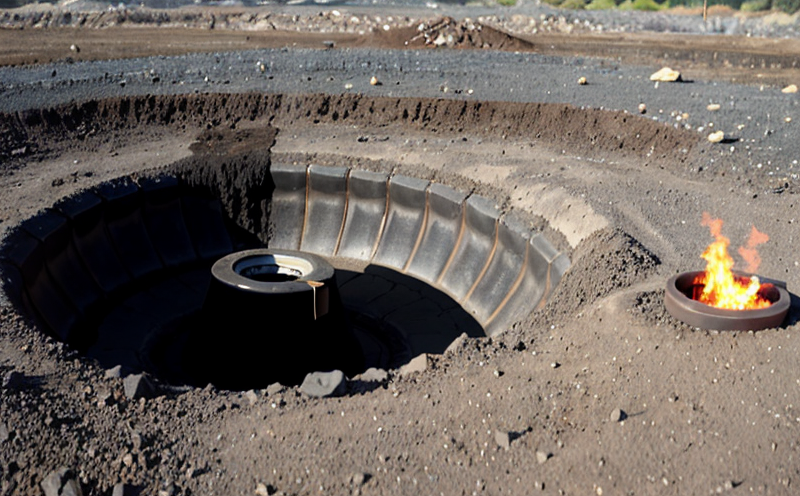DIN 51720 Moisture in Coal Testing
The DIN 51720 standard is a German industrial norm that specifies methods for determining the moisture content of coal. This testing procedure is essential for ensuring consistent quality and performance across various applications, including power generation, metallurgy, and chemical industries.
Coal's moisture content can significantly affect its energy value, combustion efficiency, and overall handling characteristics. By adhering to DIN 51720 methods, laboratories and testing facilities ensure that coal samples are accurately measured for moisture, thereby supporting reliable product quality assurance.
The procedure outlined in DIN 51720 involves drying the sample at a specified temperature (typically 105°C ± 3°C) until it reaches a constant weight. The difference between the initial and final weights of the coal sample provides an accurate measurement of its moisture content.
For quality managers, compliance officers, R&D engineers, and procurement professionals involved in coal-based industries, understanding this testing method is crucial for meeting international standards and ensuring product consistency. Proper moisture content management can lead to significant improvements in operational efficiency and cost savings.
DIN 51720 is widely recognized for its rigorous approach to moisture measurement, making it a preferred choice among professionals who demand accurate results. This standard not only ensures uniformity but also enhances the reliability of coal-based processes across different sectors.
The testing process involves several critical steps:
- Sample preparation: Ensure that the sample is representative and free from contamination.
- Drying method: Use an oven or other suitable equipment to dry the sample at 105°C ± 3°C until a constant weight is achieved.
- Weighing: Measure both the initial and final weights of the sample accurately.
Proper sample preparation and drying are essential for accurate moisture content determination. Any deviation from these steps can lead to significant errors in measurement, which could have severe implications on product quality and safety.
The DIN 51720 standard is particularly beneficial for industries that rely heavily on coal as a primary energy source or raw material. By adhering to this method, organizations can ensure that their products meet the highest quality standards and comply with international regulations.
For R&D engineers involved in developing new coal-based technologies or formulations, DIN 51720 provides a reliable framework for testing and validating their innovations. This ensures that any changes made to the composition of the coal do not adversely affect its moisture content or overall quality.
In summary, DIN 51720 Moisture in Coal Testing is an essential procedure for maintaining consistent product quality across various industries. By following this standard, organizations can ensure accurate moisture content measurement and meet international regulatory requirements.
Industry Applications
| Industry Sector | Application |
|---|---|
| Power Generation | Determining the moisture content of coal helps in optimizing combustion processes, reducing fuel costs, and improving efficiency. |
| Metallurgy | Ensuring consistent moisture levels in coal used for smelting enhances product quality and reduces energy consumption. |
| Chemical Industries | Accurate moisture content measurement is crucial for chemical reactions involving coal-based compounds, ensuring yield optimization. |
| Environmental Monitoring | Monitoring changes in coal's moisture content can help predict environmental impacts and inform mitigation strategies. |
Eurolab Advantages
At Eurolab, we pride ourselves on offering comprehensive DIN 51720 Moisture in Coal Testing services that cater to the diverse needs of our clients. Our team of experts is dedicated to delivering accurate and reliable results using state-of-the-art equipment.
We understand the importance of meeting international standards and ensuring product consistency. Our facilities are equipped with high-quality analytical instruments, including ovens and balance scales specifically designed for coal testing.
Our team of qualified technicians follows strict protocols to ensure that every test is conducted under controlled conditions, minimizing any potential errors or discrepancies. This approach guarantees that our clients receive accurate moisture content measurements that meet the highest quality standards.
In addition to accurate results, we also provide detailed reports and certificates of analysis, ensuring transparency and traceability for all testing processes. Our commitment to excellence is reflected in our unwavering focus on customer satisfaction and continuous improvement.
Our services are widely recognized for their reliability and accuracy, making us a preferred choice among organizations looking to ensure consistent product quality across various industries.
Environmental and Sustainability Contributions
DIN 51720 Moisture in Coal Testing plays a crucial role in promoting environmental sustainability by ensuring that coal-based products meet strict quality standards. By accurately measuring moisture content, organizations can optimize their processes, reducing waste and energy consumption.
Accurate moisture measurement helps in minimizing the environmental footprint associated with coal mining and usage. By adopting this standard, industries can contribute to a more sustainable future by improving operational efficiency and reducing carbon emissions.
The DIN 51720 method also supports compliance with international regulations and standards, ensuring that coal-based products are safe for use in various applications. This contributes to the overall environmental sustainability of industries that rely on coal as a primary energy source or raw material.
Through our comprehensive testing services, Eurolab plays an active role in promoting sustainable practices within the industry. Our clients benefit from accurate moisture content measurement, which helps them meet regulatory requirements and contribute to a more sustainable future.





